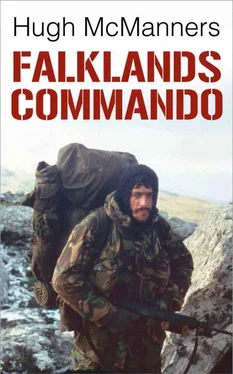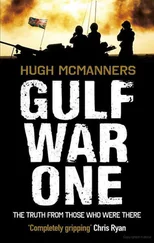Hugh McManners - Falklands Commando
Здесь есть возможность читать онлайн «Hugh McManners - Falklands Commando» весь текст электронной книги совершенно бесплатно (целиком полную версию без сокращений). В некоторых случаях можно слушать аудио, скачать через торрент в формате fb2 и присутствует краткое содержание. Город: London, Год выпуска: 2014, ISBN: 2014, Издательство: Nightstrike Publishing, Жанр: nonf_military, Биографии и Мемуары, на английском языке. Описание произведения, (предисловие) а так же отзывы посетителей доступны на портале библиотеки ЛибКат.
- Название:Falklands Commando
- Автор:
- Издательство:Nightstrike Publishing
- Жанр:
- Год:2014
- Город:London
- ISBN:978-0-992-81540-0
- Рейтинг книги:4 / 5. Голосов: 1
-
Избранное:Добавить в избранное
- Отзывы:
-
Ваша оценка:
- 80
- 1
- 2
- 3
- 4
- 5
Falklands Commando: краткое содержание, описание и аннотация
Предлагаем к чтению аннотацию, описание, краткое содержание или предисловие (зависит от того, что написал сам автор книги «Falklands Commando»). Если вы не нашли необходимую информацию о книге — напишите в комментариях, мы постараемся отыскать её.
Falklands Commando — читать онлайн бесплатно полную книгу (весь текст) целиком
Ниже представлен текст книги, разбитый по страницам. Система сохранения места последней прочитанной страницы, позволяет с удобством читать онлайн бесплатно книгу «Falklands Commando», без необходимости каждый раз заново искать на чём Вы остановились. Поставьте закладку, и сможете в любой момент перейти на страницу, на которой закончили чтение.
Интервал:
Закладка:
In a terse series of muttered conversations between paddling, we’d reconciled ourselves to landing among the enemy positions then walking to our Emergency Shore RV. This pre-determined point was about 20 miles up the coast. In a week or so, a helicopter or boat, and SBS rescue team would go there every few days at pre-set times until we were all accounted for.
But our shorter time period ‘Evasion RV’s’ were on the other side of the bay – the west, our having assumed in our planning that we would land on that side. We were therefore not at all happy about our predicament.
The 0600 cut-off time was getting closer. We steered toward the distant muzzle flashes from Plymouth’s gun, and transmitted compass bearings to her so she could search for us on the radars.
Water was coming in fast, and our furious bailing was only just keeping it ankle-deep. The GPMG and box with the Chatelaine were submerged underfoot, our radio having become the most important piece of equipment to us. Steve Hoyland sat beside me on the still-inflated port side of the RIB, radio earphones over his right ear and the left free so he could hear what was going on. The radio was on his knees and he hunched protectively over it, partially shielded by me from the waves breaking over the bow. I bailed and shouted the fire-control orders into his free ear, which he transmitted to the ship.
In the bow, two men stood precariously holding Pete Beaver’s poncho to the wind, which made the RIB, which did not have a keel, move very sluggishly in a sideways direction. But this was now very definitely taking us away from the enemy positions.
However this kindly change in wind direction was not enough to push us out to sea. So to avoid being blown onto the rocks on the eastern side of the bay, the cruciform of paddles holding up the sail was dismantled and very serious paddling began in deadly earnest.
We alternated between 10-minute intervals of bailing and paddling. Our ‘drybag’ waterproof suits, the layers of clothing underneath and the heavy, ammunition-filled combat waistcoats worn over the top made paddling very hard. Even so we were very cold, shivering constantly, the cutting wind draining away the body heat our paddling was generating.
HMS Plymouth could not come into Fox Bay to pick us up because that would have exposed her to too much risk. They’d detected an enemy Fledermaus radar. As there were intelligence reports of shore-based Exocet missiles having been deployed, this radar was causing very great anxiety.
Being a small rubber boat, we did not register on Plymouth’s radar screens, and were too far away for her to see a light, even if the weather allowed. We continued sending bearings from us to the distant muzzle flashes of her gun. Finally the two Heads loomed large to either side. I sent bearings from us to the Heads, so Plymouth’s navigator could triangulate our position.
From the shore a thousand metres away, a 30-mm cannon opened up, its tracer looping towards us in the darkness to burst over our heads with bright flashes and loud explosions that echoed round the bay. There was much machine-gun tracer being fired, also in what seemed like our direction.
Our naval gunnery was going very well in spite of everything else, with shells whispering in over our heads and exploding with deep, heartless reports that reverberated around the surrounding hills. The flashes provided brief frozen silhouettes of the hill slopes and buildings, to be enlivened by ‘extra’ detonations indicating ammunition and fuel dumps being hit.
At 0600Z there was a sound of a transport aircraft going overhead, making our part of the world seem impossibly busy. Later I was told by the Signals Intelligence spook that this was from Argentina flying an ‘air defence expert’ to Port Stanley.
0600Z was also the latest time by which we had to be back safely on board Plymouth before the Argentine fighter-bombers arrived. She’d just have time to steam flat out to the safety of the anchorage at San Carlo.
But with the cut-off time now elapsed, we’d have to land on the east side of the bay, bury the boat and walk north up the coast to our Emergency Shore Rendezvous. If we didn’t turn up, another RV even further away would be visited every week at set times until we were picked up – or until it was proved that we were dead or had been captured.
However, back in HMS Plymouth Captain Pentreath made the decision that he was going to stay and pick us up. He announced over the ship’s tannoy that we were part of his ship’s company and that he was not going to set sail from Fox Bay until we were safely back on board.
Slowly and painfully, we were getting near to the entrance of Fox Bay and the safety of the ocean. We made a frantic burst of paddling to get around East Head to avoid being sucked in by the current and onto the rocks. We then flashed a torch to where Plymouth lay, and heard on the radio that at last she’d seen us. She moved into the lee of the East Head and away from the threat of any land based missiles, launching her Gemini to tow us in.
But even with the Gemini towing, our RIB was so heavy with water and the seas so choppy we had to continue paddling. This 20-minute sprint, so close to safety, was particularly exhausting, and it was with relief and some disbelief that we gazed up at the huge rusty sides of the warship as we came alongside. The way to the deck was fifteen feet up a scramble net. Thankfully there were sailors to help, for we were very heavy with being so wet plus our ammunition, spare pistols, loaded combat vests, and assault weapons.
It was a serious effort to jump from the heaving boat onto the net, then clamber over the rail to the deck above. With the weight of our equipment, our inflatable assault lifejackets would not have held us up. In the water we would have sunk like bricks. Falling from the net did not bear thinking about. A sad end…
As we were hauled over the rail and onto the deck by willing hands, the officer of the watch piped the news of our safe arrival to the rest of the ship. I was touched to hear a spontaneous cheer erupt from the surrounding decks.
Once all were safely aboard and the RIB winched on to the deck, we went into the flight-deck hangar and stripped off our equipment, rubber dry suits and the sodden clothing underneath. From the bags we’d stowed there before we left, we took towels, dry tracksuits, thick, woollen roll-neck sweaters, socks and white plimsolls (the last three items from the excellent Navy survivors’ pack given to any sailor unlucky enough to be sunk). Already starting to feel warm again, we trooped below for a hot shower, huge breakfast, pint of beer and a deep sleep on the wardroom floor.
As we did this, Plymouth steamed flat out towards San Carlos and gained the safety of the air-defence screen. We were completely knackered.
Captain David Pentreath made a very difficult, brave decision in staying to pick us up, a decision that despite the obvious risks, his ships’ company clearly supported, judging from the enthusiasm with which they’d helped us.
But had Plymouth been Exoceted from Fox Bay when he brought the ship round the Head to get us, or had Plymouth been bombed in Falkland Sound en route to the safety of the air-defence screen at San Carlos, his judgement would have been very seriously questioned, and he would have suffered the remorse of being responsible for the deaths and injuries his sailors would have sustained.
David is typical of the rarest and very best sort of Royal Navy officer, who ignore the safe, easy, career-enhancing options, pushing themselves and their men to achieve truly great things – not that rescuing us counts as a ‘truly great’ achievement even though that’s how it will always seem to us. Nobody, least of all us, would have blamed him for pushing off at 0600 as planned. It took enormous, bloody-minded determination to ignore all the sensible reasons for doing that, to remain and pick us up.
Читать дальшеИнтервал:
Закладка:
Похожие книги на «Falklands Commando»
Представляем Вашему вниманию похожие книги на «Falklands Commando» списком для выбора. Мы отобрали схожую по названию и смыслу литературу в надежде предоставить читателям больше вариантов отыскать новые, интересные, ещё непрочитанные произведения.
Обсуждение, отзывы о книге «Falklands Commando» и просто собственные мнения читателей. Оставьте ваши комментарии, напишите, что Вы думаете о произведении, его смысле или главных героях. Укажите что конкретно понравилось, а что нет, и почему Вы так считаете.












